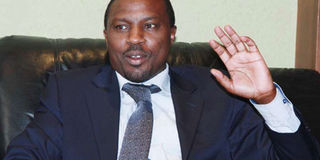NHIF takes measures to ward off fraud

National Hospital Insurance Fund CEO Geoffrey Mwangi speaks during an interview at Nation Centre on April 25, 2017. Mr Mwangi said reports that NHIF did not have money were baseless. PHOTO | CHARLES KAMAU | NATION MEDIA GROUP
What you need to know:
- Mr Mwangi said some hospitals were duplicating claims and charging for services not rendered.
- Many NHIF members cannot get critical treatment because of the insurer’s failure to settle their medical bills.
The National Hospital Insurance Fund has begun a crackdown on hospitals making fake claims.
NHIF chief executive Geoffrey Mwangi told the Nation on Monday that hospitals were taking advantage of the insurer’s quick settlement of claims to make money fraudulently.
“Many claims have been rejected. Some hospitals are stealing from us and that has to stop,” Mr Mwangi said.
“The hospitals have been informed why we have taken time to pay. It is because we have set another layer for scrutinising claims.”
SERVICES
Mr Mwangi said some hospitals were duplicating claims and charging for services not rendered.
“Why would you bill us for serious surgery if you only conducted a minor one?
"Some hospitals say they performed three dialysis sessions when they have done only two,” he said, adding that it was wrong for doctors to set up stand-alone clinics and offer substandard treatment.
He said NHIF could place patients in units offering quality services.
“We will not have a problem paying for that,” he said.
CASH-STRAPPED
Mr Mwangi gave an example of a private hospital that was demanding Sh8.5 million for dialysis sessions in July alone.
“It means the hospital had 472 dialysis sessions and attended to 237 patients. Can a stand-alone clinic get this number of patients in a month?” he asked.
Mr Mwangi said reports doing the rounds that NHIF did not have money were baseless.
“We usually pay within 21 days of receiving a claim,” he said.
DEBT
An NHIF official, who sought anonymity, said the organisation should stop “playing games with lives of Kenyans” and settle patients’ bills.
“Not all hospitals are involved in the said fraud. Why can’t NHIF address genuine cases and deal with culprits later? Patients are suffering,” he said.
Many NHIF members cannot get critical treatment because of the insurer’s failure to settle their medical bills.
A number of hospitals across the country, especially private ones, have put patients on notice, insisting that they offset the bills.
The hospitals also threatened to stop accepting NHIF cards from yesterday until the bills, running into millions of shillings, were cleared.
“You cannot solve a problem by creating a bigger one,” the NHIF official said.




